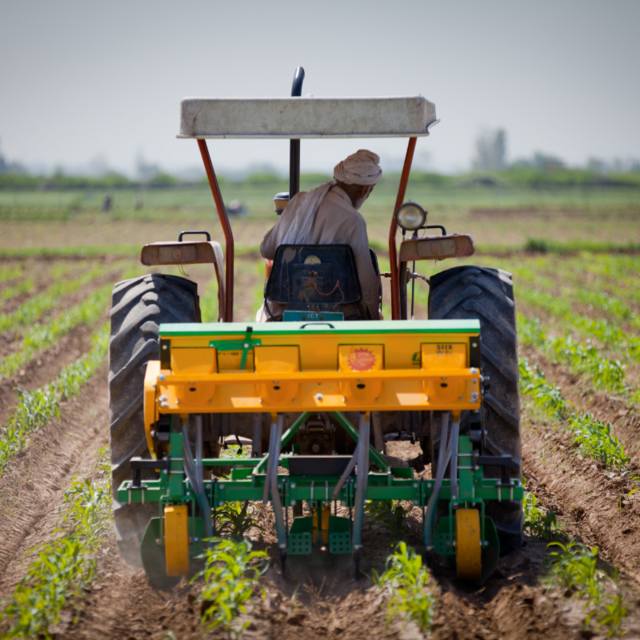-
Addressing the Global Food Crisis: CIMMYT Experts Weigh In
July 29, 2022 By Claire Doyle The confluence of climate change, COVID-19, and the war in Ukraine have placed enormous stress on food systems across the globe. Food insecurity spiked in 2020 and has stayed high, and the number of undernourished people is on the rise.
The confluence of climate change, COVID-19, and the war in Ukraine have placed enormous stress on food systems across the globe. Food insecurity spiked in 2020 and has stayed high, and the number of undernourished people is on the rise.The confluence of climate change, COVID-19, and the war in Ukraine have placed enormous stress on food systems across the globe. Food insecurity spiked in 2020 and has stayed high, and the number of undernourished people is on the rise.
As we respond to this emergency, there is an opportunity—and a need—to strengthen the kind of strategic investments that will make our agrifood systems resilient to tomorrow’s shocks. “We cannot be running crisis to crisis,” says Bram Govaerts, Director General of the International Maize and Wheat Improvement Center, or CIMMYT, in this week’s New Security Broadcast. “We need to look at the underlying elements that are provoking these ripple effects.”
On the episode, ECSP Director Lauren Risi and ECSP Advisor Sharon Burke speak with Govaerts and his colleague Kai Sonder, head of CIMMYT’s Geographic Information System Unit, about how to address the unfolding food crisis as we simultaneously build food system resilience in the medium and long term. Drawing from their newly-published article in Nature Food, Govaerts and Sonder share approaches that governments, civil society, and private actors can take to tackle today’s wheat supply disruptions and food insecurity. They also share past success stories and lay out key challenges moving forward.
Beyond the immediate humanitarian aid needed to boost food security, Govaerts identifies intensified wheat production and greater investments in local cereals as essential short-term priorities. Medium-term investments should focus on agricultural production that is agroecologically suitable, policies that support the adoption of improved crop varieties, and data analysis to target the vulnerabilities of smallholder farmers. And with long term goals in mind, Govaerts says that we need to ask “how can we enhance our ecosystem diversity, resolve the gender disparity [in the agricultural sector] and invest in agrifood transformation from efficiency to resilience?”
Both experts emphasize that these approaches aren’t meant to be taken incrementally. “We’re really saying we need to start today, taking actions with an impact on the short, medium, and long term. It would be a mistake to only focus on the short-term actions that need to be taken,” says Govaerts.
Sonder acknowledges that transforming agricultural systems takes time—and isn’t easy. “You need to invest in breeding systems. You need to build capacity and identify areas where that is easily possible,” he explains. “Bringing out a new variety of wheat or maize or other crop takes up to ten years.”
Introducing new farming technologies can also come with challenges, since it requires making sure those technologies can actually be maintained. “You have to ensure that there are mechanics who can fix [them] quickly, that there’s a supply chain for spare parts,” observes Sonder. And securing sustained large-scale investment for research or program activities can prove difficult, as was the case for a study CIMMYT did on the potential for wheat in Africa. “The ministers were very interested,” Sonder says. “But other crises come along, and then the funds go somewhere else.”
Despite the hurdles, there are plenty of examples of agrifood interventions with positive impact. For instance, one of CIMMYT’s current areas of work is in developing risk assessment and disease warning systems to allow people to act quickly before a crisis occurs. Sonder describes how his colleagues in Ethiopia had a recent success in identifying a risk of rust epidemic in collaboration with the government and stakeholders on the ground by using weather models. The joint effort allowed the government “to procure and to spread fungicides and to be prepared for that crisis,” he says.
Addressing the challenges that underlie world hunger will take both this kind of strategic medium-term action as well as longer-term transformations—Even as we respond to the current hunger crisis with much-needed short-term efforts, we can also be reshaping our global agricultural systems for a more biodiverse, equitable, and resilient future.
New Security Broadcast is also available for download on iTunes and Google Podcasts.
Editor’s note: This article has been updated with the correct spelling of CIMMYT.
Sources: Food and Agriculture Organization of the UN, Nature, World Economic Forum
Photo Credit: Man applies fertilizer using multi-crop bed planter in maize field in Islamabad, Pakistan, courtesy of Flickr user USAID Pakistan.
 A Publication of the Stimson Center.
A Publication of the Stimson Center.

 The confluence of climate change, COVID-19, and the war in Ukraine have placed enormous stress on food systems across the globe.
The confluence of climate change, COVID-19, and the war in Ukraine have placed enormous stress on food systems across the globe. 

